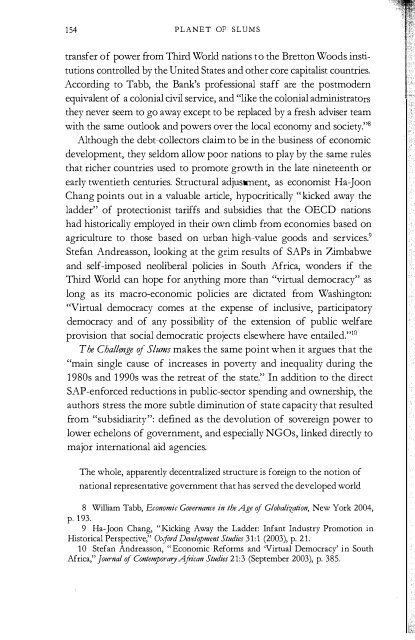Untitled - Rebel Studies Library
Untitled - Rebel Studies Library
Untitled - Rebel Studies Library
You also want an ePaper? Increase the reach of your titles
YUMPU automatically turns print PDFs into web optimized ePapers that Google loves.
154 PLANET OF SLUMS<br />
transfer of power from Third World nations to the Bretton Woods institutions<br />
controlled by the United States and other core capitalist countries.<br />
According to Tabb, the Bank's professional staff are the postmodern<br />
equivalent of a colonial civil service, and "like the colonial administrators<br />
they never seem to go away except to be replaced by a fresh adviser team<br />
with the same outlook and powers over the local economy and society."8<br />
Although the debt-collectors claim to be in the business of economic<br />
development, they seldom allow poor nations to play by the same rules<br />
that richer countries used to promote growth in the late nineteenth or<br />
early twentieth centuries. Structural adjusknent, as economist Ha-Joon<br />
Chang points out in a valuable article, hypocritically "kicked away the<br />
ladder" of protectionist tariffs and subsidies that the OECD nations<br />
had historically employed in their own climb from economies based on<br />
agriculture to those based on urban high-value goods and services.9<br />
Stefan Andreasson, looking at the grim results of SAPs in Zimbabwe<br />
and self-imposed neoliberal policies in South Africa, wonders if the<br />
Third \X'orld can hope for anything more than "virtual democracy" as<br />
long as its macro-economic policies are dictated from Washington:<br />
"Virtual democracy comes at the expense of inclusive, participatory<br />
democracy and of any possibility of the extension of public welfare<br />
provision that social democratic projects elsewhere have entailed."IO<br />
The Challenge of Slums makes the same point when it argues that the<br />
"main single cause of increases in poverty and inequality during the<br />
1980s and 1990s was the retreat of the state." In addition to the direct<br />
SAP-enforced reductions in public-sector spending and ownership, the<br />
authors stress the more subtle diminution of state capacity that resulted<br />
from "subsidiarity": defined as the devolution of sovereign power to<br />
lower echelons of government, and especially NGOs, linked directly to<br />
major international aid agencies.<br />
The whole, apparently decentralized structure is foreign to the notion of<br />
national representative government that has served the developed world<br />
8 William Tabb, Economic Governance in the Age of Globalization, New York 2004,<br />
p. 193.<br />
9 Ha-Joon Chang, "Kicking Away the Ladder: Infant Industry Promotion in<br />
Historical Perspective," OxfiJrd Development <strong>Studies</strong> 31:1 (2003), p. 21.<br />
10 Stefan Andreasson, "Economic Reforms and 'Virtual Democracy' in South<br />
Africa," Journal of Contemporary African <strong>Studies</strong> 21:3 (September 2003), p. 385.<br />
SAPING THE THIRD WORLD<br />
well, while it is very amenable to the operations of a global hegemony.<br />
The dominant international perspective [i.e., Washington's] becomes the<br />
de facto paradigm for development, so that the whole world rapidly<br />
becomes unified in the broad direction of what is supported by donors<br />
and international organizations.ll<br />
Urban Africa and Latin America were the hardest hit by the artificial<br />
depression engineered by the IMF and the White House - indeed, in<br />
many countries the economic impact of SAPs during the 1980s, in<br />
tandem with protracted drought, rising oil prices, soaring interest<br />
rates, and falling commodity prices, was more severe and long-lasting<br />
than the Great Depression. Third World cities, especially, were<br />
trapped in a vicious cycle of increasing immigration, decreasing<br />
formal employment, falling wages, and collapsing revenues. The IMF<br />
and World Bank, as we have seen, promoted regressive taxation<br />
through public-service user fees for the poor, but made no ' counterpart<br />
effort to reduce military expenditure or to tax the incomes or real<br />
estate of the rich. As a result, infrastructure and public health everywhere<br />
lost the race with population increase. In Kinshasa, writes<br />
Theodore Trefon, "the population refers to basic public services as<br />
'memories.'''12<br />
The balance sheet of structural adjustment in Africa, reviewed by<br />
Carole Rakodi, includes capital flight, collapse of manufactures,<br />
marginal or negative increase in export incomes, drastic cutbacks in<br />
urban public services, soaring prices, and a steep decline in real wagesY<br />
Across the continent people learned to say "I have the crisis" in the<br />
same way one says, "I have a cold."14 In Dar-es-Salaam, public-service<br />
expenditure per person fell 10 percent per annum during the 1980s, a<br />
virtual demolition of the local state.1S In Khartoum, liberalization and<br />
11 Challenge, p. 48.<br />
12 Theodore Trefon, "Introduction: Reinventing Order," in Trefon, Reinventing<br />
Order in the Congo, p. 1.<br />
13 Rakodi, "Global Forces, Urban Change, and Urban Managementin Africa," in<br />
Rakodi, Urban Challenge, pp. 50, 60-61.<br />
14 Achille Mbembe and Janet Roian, "Figures of the Subject in Times of<br />
Crisis," in Enwezor et al., Under Siege, p. 112.<br />
15 Michael Mattingly, "The Role of the Government of Urban Areas in the<br />
Creation of Urban Poverty," in Sue Jones and Nici Nelson (eds), Urban Poverty .<br />
in<br />
Africa: From Understanding to Alleiation, London 1999, p. 21.<br />
155


